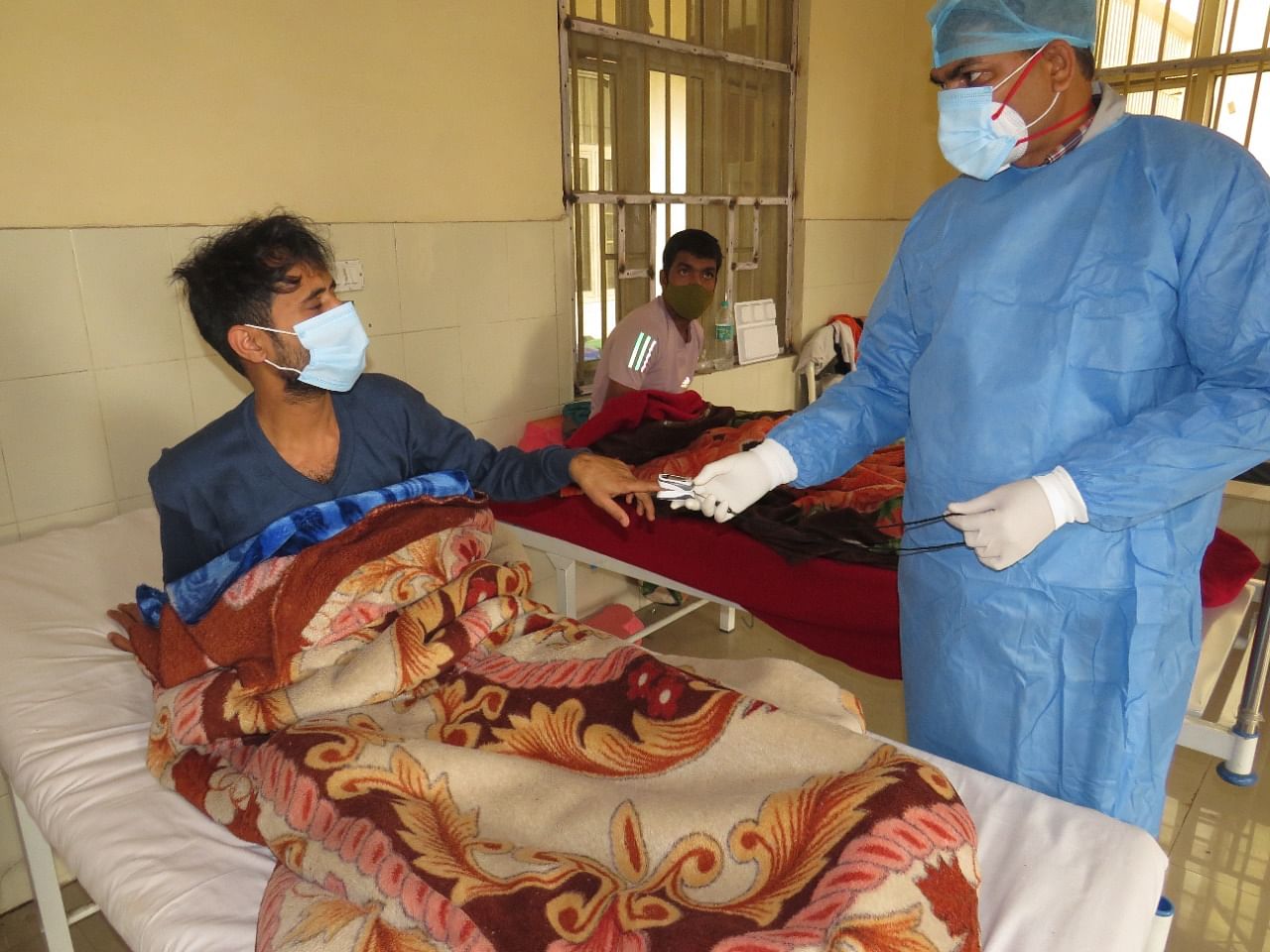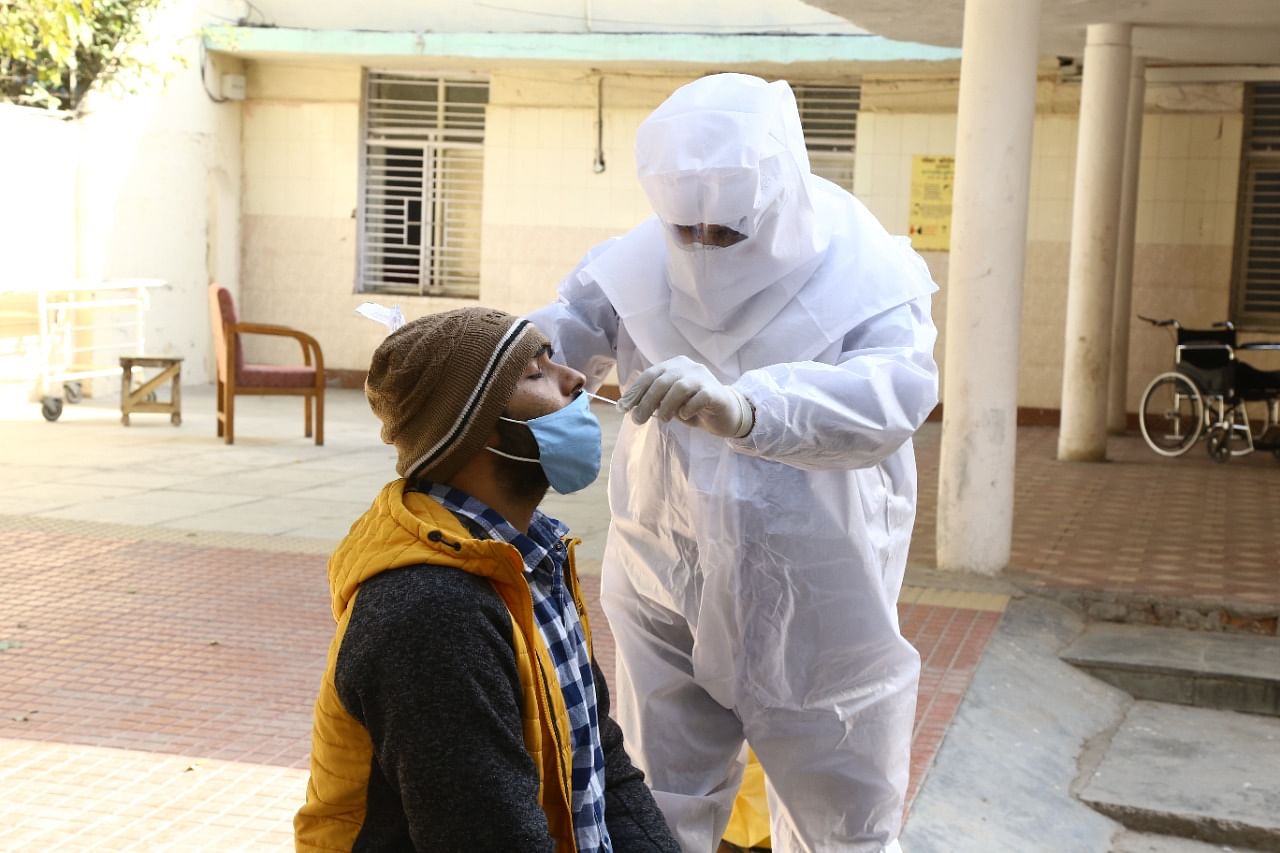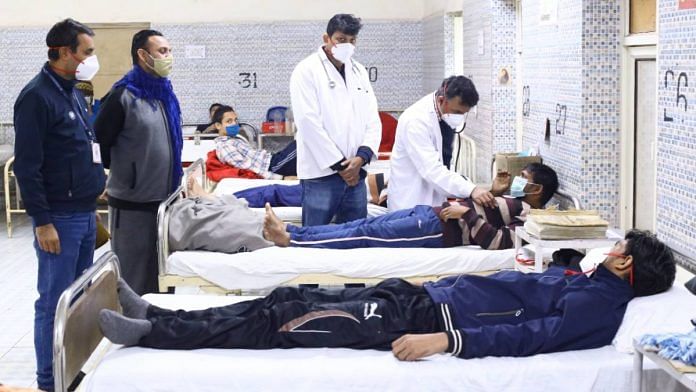New Delhi: Sixteen Covid care dispensaries and medical isolation-observation wards, doctors on duty round the clock, jail staff monitoring Covid-appropriate behaviour among inmates — these are the arrangements that have been made in Delhi prisons to tackle the third wave of the Covid pandemic.
A new oxygen plant has also been installed in the Tihar prison complex — India’s largest jail and one of the world’s biggest — and it will soon be functional.
The capital city has three prisons — Tihar, Mandoli and Rohini — and they are divided into a total of 16 jails, marked Jail No. 1 to 16. Jails 1 to 9 are in Tihar, Jail No. 10 is in Rohini and Jails 11 to 16 are in Mandoli prison.
Delhi prisons have been reeling under the devastating impact of the Covid-19 pandemic despite the decongestion of the jails in the past two years following court orders.
The number of inmates lodged in prisons is still around 1.8 times their full capacity. The capacity of the three prisons is around 10,026, but over 18,000 prisoners are lodged there at present.
A total of 99 prison inmates and 88 staffers tested positive for Covid-19 between late December and 15 January, during the third wave, out of whom 17 prisoners and 14 staffers have recovered, data accessed by ThePrint showed.
To combat the surge, all new inmates have to undergo Covid tests. Those who test positive are moved to the jail hospitals, the rest are kept in a seven-day quarantine period. All prison staff have been fully vaccinated too.
The Delhi Prisons Department has also set up medical centres inside jails to treat the Covid patients. The 16 dispensaries within the three prison complexes have been converted into Covid care centres with attending doctors on round-the-clock duty, a medical inspection room, 10-12 patient beds, and a pharmacy.
Apart from these Covid care centres, there are also two jail hospitals — a 120-bed hospital in Central Jail No. 3 in Tihar and a 48-bed hospital in Central Jail No. 13 in Mandoli.
Also read: 99 inmates, 88 staff members in Delhi’s jails have tested positive for COVID-19: Officials
Constant monitoring, all staff vaccinated
Speaking to ThePrint, Director General Prisons Sandeep Goel said “in view of the Covid pandemic, amid the rising cases, the government had declared the two jail hospitals as Covid health centres and all the jail dispensaries as Covid care centres last year”.
“There are additional facilities to deal with Covid patients, like medicines, oxygen availability, PPE kits etc,” Goel added. “Each jail has around three doctors, plus sufficient nursing staff and pharmacists.”
“The health of the patients — prisoners and staffers — are constantly monitored. Asymptomatic or mild cases of Covid are managed in-house. Serious cases are referred to government hospitals. However, there have been no serious cases in the third wave,” the officer added.
According to the data accessed by ThePrint, as of 31 December 2021, a total of 22,620 doses of Covid vaccines had been administered to inmates — 15,452 prisoners got their first dose and 7,168 were given the second dose. Goel said that all jail staff have been fully vaccinated.
Surviving the pandemic waves
During the devastating second wave of the Covid-19 pandemic, Delhi prisons witnessed at least eight inmates dying from Covid-related complications, while 383 tested positive. During the peak of last year’s wave, 224 jail staff were also infected.
It was during this time that the government decided to convert the dispensaries into Covid care centres to tackle the surge.
Among those dead was a 45-old prisoner, Mohammed Anish, who passed away a day after testing positive for Covid-19. He was lodged in Tihar Jail since December 2019 in a case lodged under the Narcotic Drugs and Psychotropic Substances Act. Gangster-turned- politician and former RJD MP Mohammed Shahabuddin, lodged in Tihar, also died due to Covid complications at a Delhi hospital.

During the first wave in 2020, two prisoners had died of Covid, with 120 inmates testing positive. Among jail staffers, 293 had tested positive.
Currently, as a rule, all new inmates have to undergo a Covid Rapid Antigen Test. If they test positive, he or she is directly admitted to the jail’s Covid health centre. Those who test negative are also quarantined for seven days before they are moved to the jail barracks.
“Inmates are regularly educated about the symptoms of Covid-19 and its new variants. They are asked on a regular basis to inform jail staff as soon as anyone develops ILI (influenza-like illness) symptoms. Moreover, senior jail staff and doctors also keep visiting the wards to monitor the situation,” Goel said.
“As soon as any inmate with ILI symptoms is found, he is immediately separated from others and sent to an isolation ward. He is kept under medical observation there and moved to a jail dispensary or jail hospital, if needed,” he added.
‘Social distancing difficult’
During the first two waves of the coronavirus pandemic, undertrials and convicts who met certain criteria were released following court orders to decongest the prisons. This year no one has been released.
“Those released during the second wave are still out and they have not been asked to surrender in view of a Supreme Court order,” DG Goel said, adding that this has been done to keep the jails from overcrowding.
During the first wave, 1,184 convicts and 5,556 undertrial prisoners were released. During the second wave, 882 convicts and 4,621 undertrial prisoners were released on emergency parole and interim bail, respectively.

Jail officials said that handling the surge in cases has been extremely difficult due to overcrowding. Moreover, maintaining social distancing has been a tough task.
“Since the jails are already overcrowded, social distancing is difficult. The only way out to keep the number of infections under control is to immediately remove and isolate any inmate showing symptoms of illness. Each inmate is provided with sufficient face masks and tabs are kept so that they wear it while interacting with others, especially when they are let out of their barracks during the open time and interact with other inmates of the ward,” Goel said.
“At other places where inmates of different wards meet, in the dispensary, canteen, telephone facility, video conferencing for court appearance etc, strict observance of social distancing is maintained through circles marked on the floor,” he added.
Jail staff most at risk
Jail officials said that while each of the 16 jails have medical isolation wards, special attention is paid to the barracks where the elderly are lodged.
Jail staff who have been tasked with making sure inmates follow Covid protocols face the most risk.
“Apart from them having to interact with inmates continuously for various purposes, keeping the prisoners motivated and making them observe Covid-appropriate behaviour is not easy. Moreover, the jail staff have to also take care of inmates who are ill, symptomatic and sometimes even Covid-positive, apart from having to deal with some non-cooperative and aggressive inmates,” Goel said.
While welfare committees have been formed to provide aid to families of jail staff who test positive, in order to ensure the mental well-being of the inmates, regular counselling sessions are conducted.
(Edited by Saikat Niyogi)
Also read: Dispensaries in Delhi jails turned Covid care centres, oxygen plant in Tihar to start working soon



